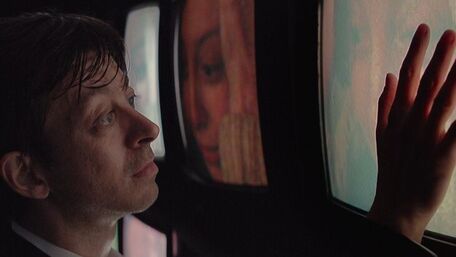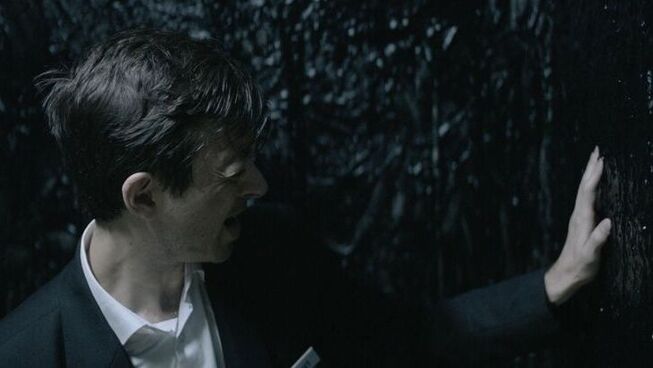 There are two types of people in this world: those that cover up their webcams when they’re not using them, and those who don’t… ...Personally, I’m the former, and keep a small piece of craft tape covering my laptop camera at all times. It’s a side effect from years of watching and enjoying films just like this one, which have left me cautious when it comes to technology and surveillance. Writer/director Orçun Behram’s feature debut, The Antenna is a timely, dystopian political horror that reflects modern Turkey’s state of crisis, where freedom of speech is very much in jeopardy. Set in a version not all that different from present reality—living in fear of the state and the level of control the government has over their lives—the story takes place in an isolated and crumbling apartment building in the middle of nowhere. It begins when a maintenance worker arrives to install a satellite dish issued by the government as a way to control and monitor their citizens. Mehmet (Ihsan Önal), the building superintendent, is responsible for overseeing the process. But something goes wrong and the maintenance worker falls from the roof and dies, right in front of some tenants standing outside, and it’s quickly ruled an “accidental workplace injury”. For the most part everyone moves on quickly and carries on with their day, after a few obligatory comments about how sad it is, but a strange black liquid begins oozing from the antenna. It slowly works its way down into the apartments, seeping through tiles and dripping from plug sockets. And it just keeps spreading. As they wait for the midnight bulletin, the tenants begin to be tormented and even killed, and only Mehmet seems to notice what is happening. Will he figure out how to stop it before the black goo gets to him too? All of the building’s residents seem to feel the same way about it: neither excited, afraid, nor surprised, merely resigned to this new invasion of their privacy. Mehmet is the definition of an average man. We don’t learn a lot about him or his past; he seems more like a blank slate. This is no knock on the film’s abilities, rather it turns Mehmet into a figure who could be anyone. I found myself emotionally attached to his character and his journey thanks to Önal’s great performance. The other tenants all felt surprisingly authentic and multi-faceted to me, even though we’re only given small glimpses into their everyday lives. There’s the hard-ass landlord, Mehmet’s boss, who lives with his wife and child, and the woman who complains about her bathroom and is so scared of aging that she injects Botox into her own face. And then there’s the most likeable of them all, Yasemin (Gül Arici), a young woman who lives with her parents, a quiet mother and a father that just wants to marry her off so he doesn’t have to worry about her anymore. We meet Yasemin when she sits down with Mehmet and the two of them have a cigarette together. They talk openly about their dislike of the way things are—but not too openly—and Mehmet even goes as far as giving her a ticket so she can escape. Yasemin is moody and melancholy, and she’s incredibly easy to root for right from the beginning. The apartment building itself is a terrifying setting for this story, becoming a claustrophobic labyrinth that’s impossible to navigate. Each home is completely different on the inside depending on who lives there, but outside everything is run down and washed out. It’s a direct contradiction to the beautiful shots of the barren Turkish landscapes that surround it, the wide-open spaces making the apartment building feel that much more isolated and scary. As it’s a single location movie, we learn about the broader picture and what’s happening outside through transmissions and broadcasts. We’re given only small snippets of information but not enough for us to get a clear understanding. All we can gather is that the government wants the citizens to act as obedient cogs in their machine, and they will be punished if they don’t. That works, in part, because we see the situation completely through our characters’ eyes, allowing the film to reflect the way many of us only hear about things happening outside our circles rather than seeing them play out ourselves. The single-location strategy is also a bit of a detriment, however. There were a few times when the story got a little too convoluted because of it, and moments where style overshadowed substance. The Antenna is a visually stunning film, with a pale and washed out colour palette I find very appealing, and incredible cinematography by Engin Özkaya that utilised a lot of extreme angles, striking imagery, and fantastic lighting. The haunting score by Can Demirci and sound design by Erdinç Kaya were some of my favourite parts of the movie, both effectively used to build the atmosphere and ramp up the suspense. One notable aspect of the sound design I appreciated a lot was the use of no sound in certain moments. This use of silence was both compelling and well-balanced, making everything more intense and overwhelming in the best way possible. The Antenna is a timely and striking political horror with a lot of ambition and some truly creepy moments. It will leave you wondering about the technology in your own house, and by its end you, too, might end up with a piece of craft tape over your webcam. The Antenna comes to VOD from Dark Star Pictures on October 20th. By Dani Vanderstock
0 Comments
Leave a Reply. |
Archives
March 2023
|


 RSS Feed
RSS Feed